
-
 Trump-backed Republican Johnson elected speaker of US House
Trump-backed Republican Johnson elected speaker of US House
-
Gaza rescuers say about 30 killed as truce talks resume

-
 UK, Germany electricity cleanest on record in 2024
UK, Germany electricity cleanest on record in 2024
-
Oil from Russian tanker spill reaches Sevastopol
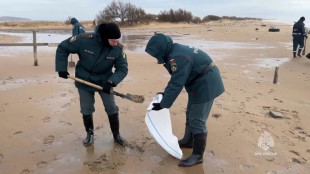
-
 Man arrested for supplying drugs to Liam Payne: Argentine police
Man arrested for supplying drugs to Liam Payne: Argentine police
-
US House rejects Trump-backed speaker in first ballot

-
 European ministers urge inclusive transition on Syria visit
European ministers urge inclusive transition on Syria visit
-
Rickelton hits Test best as South Africa on top against Pakistan

-
 Lebanon minister says working to 'resolve' Syria's new entry restrictions
Lebanon minister says working to 'resolve' Syria's new entry restrictions
-
US announces $306 mn in new bird flu funding
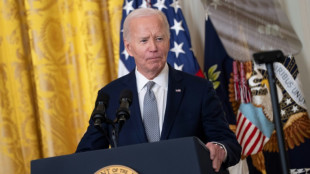
-
 Salah targets Premier League glory in 'last year' at Liverpool
Salah targets Premier League glory in 'last year' at Liverpool
-
Rockets fired from Gaza as Israeli strikes kill 16, rescuers say

-
 Marseille coach De Zerbi defends 'strong' Ligue 1
Marseille coach De Zerbi defends 'strong' Ligue 1
-
Rickelton, Bavuma tons put South Africa in strong position

-
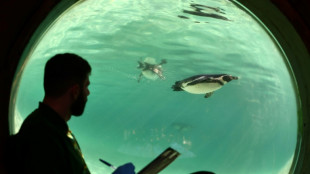 Breeding success: London zoo counts its animals one-by-one
Breeding success: London zoo counts its animals one-by-one
-
Fofana could miss rest of Chelsea's season

-
 Republican speaker, Trump face test in Congress leadership fight
Republican speaker, Trump face test in Congress leadership fight
-
Man Utd 'starving for leaders' ahead of Liverpool clash: Amorim

-
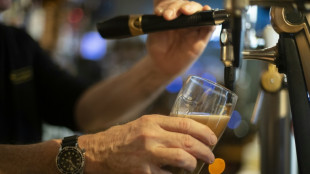 Alcohol should have cancer warning label: US surgeon general
Alcohol should have cancer warning label: US surgeon general
-
Biden blocks US Steel sale to Japan's Nippon Steel

-
 Wall Street stocks bounce higher, Europe retreats
Wall Street stocks bounce higher, Europe retreats
-
Neil Young says he will play Glastonbury after all
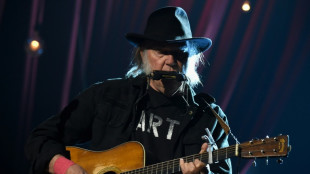
-
 Frenchman Castera plots roadmap for Dakar success
Frenchman Castera plots roadmap for Dakar success
-
Doha hosts PSG clash with Monaco in French Champions Trophy

-
 Hamilton 'excited for year ahead' after Ferrari switch
Hamilton 'excited for year ahead' after Ferrari switch
-
Man City must 'think' about De Bruyne future: Guardiola

-
 Biden blocks US-Japan steel deal
Biden blocks US-Japan steel deal
-
French police to face trial for 'suffocating' death

-
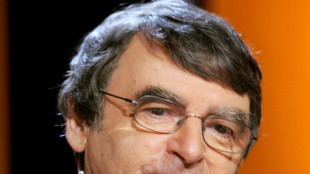 British novelist David Lodge dies aged 89
British novelist David Lodge dies aged 89
-
Indonesia says 2024 was hottest year on record
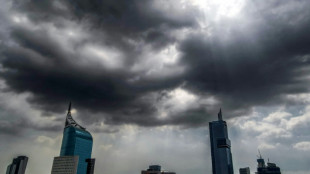
-
 South African Lategan wins Dakar Rally prologue
South African Lategan wins Dakar Rally prologue
-
Barca coach Flick optimistic but 'not happy' over Olmo situation

-
 Djokovic Australian Open preparations take hit with loss to Opelka
Djokovic Australian Open preparations take hit with loss to Opelka
-
Indian duo self-immolate in Bhopal waste protest

-
 Indian food delivery app rolls out ambulance service
Indian food delivery app rolls out ambulance service
-
Arsenal must 'flip coin' in Premier League title race, says Arteta

-
 European stock markets retreat after positive start to year
European stock markets retreat after positive start to year
-
World food prices dip 2% in 2024: FAO

-
 The horror of Saydnaya jail, symbol of Assad excesses
The horror of Saydnaya jail, symbol of Assad excesses
-
Sabalenka sets up Brisbane semi against Russian teen Andreeva

-
 Top European diplomats urge inclusive transition in Syria visit
Top European diplomats urge inclusive transition in Syria visit
-
Liverpool's Slot says Man Utd 'much better' than league table shows

-
 UK electricity cleanest on record in 2024: study
UK electricity cleanest on record in 2024: study
-
Rampant Czechs set up United Cup semi-final against US

-
 Rohit omission from decisive Test 'emotional' says India's Pant
Rohit omission from decisive Test 'emotional' says India's Pant
-
Beijing slams US over potential Chinese drone ban

-
 Blinken to visit South Korea with eye on political crisis
Blinken to visit South Korea with eye on political crisis
-
Vietnam's capital blanketed by toxic smog
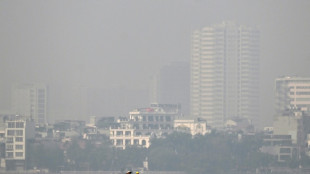
-
 Top European diplomats in Syria for talks with leader Sharaa
Top European diplomats in Syria for talks with leader Sharaa
-
Andreeva, Dimitrov into Brisbane semis in contrasting fashion


Romania, Bulgaria join borderless Schengen zone
Romania and Bulgaria became full members of the Schengen zone on Wednesday, expanding the borderless area to 29 members and ending a 13-year wait for the two eastern European countries.
The expansion, made possible when Austria and other members dropped their objections to the former communist countries joining, officially took place at midnight (2200 GMT) on January 1, marked by ceremonies at various border posts.
Romania and Bulgaria, both members of the European Union since 2007, were partially included in the Schengen zone in March, eliminating border checks at ports and airports.
But Austria had threatened to veto their full entry over migration concerns, which meant that controls still applied at land border crossings.
Vienna backed off its veto threat in December after the three countries reached a deal on a "border protection package", clearing the way for Romania and Bulgaria, two of the EU's poorest countries, to join Schengen.
Created in 1985, the zone will now include 25 of the EU's 27 members, as well as Switzerland, Norway, Iceland and Liechtenstein, covering a total population of more than 400 million people.
Romania and Bulgaria had met the Schengen zone's technical requirements for membership since 2011.
But "member states objected every time" they tried to join, analyst Valentin Naumescu told AFP.
That became "a source of frustration exploited by anti-EU parties, which alleged Romania was being treated unfairly", he said.
The resentment came into play in Romania's recent presidential elections, in which far-right candidate Calin Georgescu surged to a surprise first-round win, before the polls were cancelled amid claims of Russian interference.
Now, "that feeling of being second-class citizens" should fade, Naumescu said.
- Truckers celebrate -
Leaders on both sides hailed the expansion as "historic".
Austria had for years complained about hosting a disproportionate number of undocumented migrants as a result of poorly protected external Schengen borders.
It dropped its objections to Romania (population 19 million) and Bulgaria (6.5 million) joining Schengen after the three countries signed a border protection agreement in November.
The deal provides for the joint deployment of guards to the Bulgarian-Turkish border and temporary controls at land crossings for an initial period of six months.
Joining the zone will boost Romania's and Bulgaria's gross domestic product (GDP) by at least one percentage point, analysts estimate.
Lorry drivers, who currently wait up to 20 hours at border crossings, celebrated the news.
"It was a pure waste of time for drivers, who couldn't even stop to rest because they had to move their vehicles every 10 minutes," said Beniamin Lucescu, head of a Romanian transport federation.
Poor road and railroad infrastructure in Bulgaria could limit the positive impact there, however.
The countries' tourism sectors are meanwhile expecting a surge in visitors from the two countries to nearby Greece.
"It's excellent news," said 46-year-old sales manager Ivailo Kirkov, who owns a house in northern Greece.
"We'd been waiting impatiently."
Greek teacher and tour guide Gueorgui Grantcharov predicted a rush of Romanian and Bulgarian tourists to Greece.
With no queues at the border, "it takes just over four hours to get from Sofia to Thessaloniki", he said.
Ch.Kahalev--AMWN